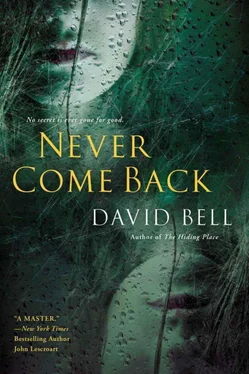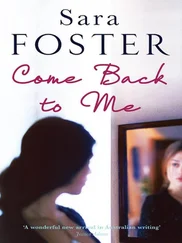“But you didn’t know everything about your mother,” Post said. Her voice was flat. She didn’t add any “gotcha” inflection. She didn’t need to. She had, indeed, made her point and proven my argument to be vulnerable.
But I wouldn’t be so easily swayed, at least not on the point in question. “I don’t think my mom even dated any other man before my dad. I know, I know—we all find it hard to think about our parents as sexual beings.”
“It can seem like parents didn’t have lives before their children were born.”
“My mom especially,” I said. “I know you didn’t know her, but she was so… closed off to the world. So rigid and uptight. She didn’t let anybody in. I don’t know how my dad ever got through to her.”
Post leaned back in her chair, stretching her thin body out and trying to adopt what might look like a more casual posture. Was she trying to suggest we were just two girls chatting? That I could tell her anything? Anything at all about the murder of my mother?
“You never really told us about this argument you were having with your mother,” she said. “Things were chaotic that night, of course. But could you tell me what it was about?”
I told her about Mom’s insistence that I promise I would always be there for Ronnie and always take care of him. I explained that Mom’s biggest fear was what would happen to Ronnie if she were ever incapacitated or died. “My uncle says Mom was really worried about it because she was getting older and my uncle is getting older. I guess she saw me as the last, best hope.”
“So what was the fight about?” Post asked, still not getting it.
Or was I the one not getting it? I thought the problem was clear as day, but apparently the detective still didn’t understand.
“I didn’t make the promise,” I explained. “I just didn’t.”
Post raised her eyebrows. She didn’t say anything. She didn’t need to. Her expression said it all.
“I would think you would understand,” I said. “If you’re trying to have a career, you can’t be caring for someone. Not someone like Ronnie.”
“Some people would say family always comes first,” Post said.
“I know, but we had family. My uncle… and my mom was fine then. It’s not like she knew—” Post and I locked eyes. Again, she didn’t reveal anything. She let me reach the conclusion. “She couldn’t have known anything was going to happen to her. Could she?”
“There’d already been one incident with your brother,” Post said. “One serious enough to warrant the police being called.”
I didn’t know where to look. I let my eyes wander around the room, past the stupid books, the coffee machine, anywhere but on Post. What she was suggesting didn’t make sense. If Mom felt her life was in danger from her own son, why would she insist on making me a participant in his long-term care? She’d be endangering me as well. Right?
Unless…
“She might have thought, or hoped, I wouldn’t turn him over to an institution or something like that. She must have thought a family member wouldn’t do that.”
“Would your uncle?” Post asked.
“Never. He loves Ronnie. He’s better with Ronnie than I am.”
Post didn’t respond. She tapped her pen against the notebook a few times, a slow metronomic beat. She waited. Was she keeping something from me? I wondered.
“Do you know something about this I don’t know?” I asked. “Did Paul say something to you about all of this?”
Finally, she said, “Your mother apparently didn’t tell you about a lot of the things that were going on in her life. She kept these things to herself.”
“So?”
“So I’m just saying that if there’s one thing I’ve learned from doing this job, it’s that people possess an infinite capacity to surprise.”
“Are you trying to suggest something?” I asked.
“What I can tell you is that your brother remains a suspect in your mother’s death.” She flipped her notebook shut. “As far as issues between your uncle and your mother, or between you and your uncle, those are for you to figure out.”
That afternoon, after my class, I went to Dover Community to see Ronnie. When I arrived, a nurse intercepted me and told me I couldn’t go in because a doctor was examining my brother. I had never seen the nurse working there before, but it seemed like every time I went to the hospital a different one was working. There must have been an unlimited supply. I had hoped to see Janie. A friendly face was always welcome.
“You can come back later if you want,” the nurse said. “Or you can wait.”
“How long?” I asked.
“It could take an hour or so.”
I thought of the bag in my car, the one filled with thirty ungraded essays. I needed to tend to them.
Then the nurse said, “Your uncle went to the cafeteria. You could go wait with him if he’s still there.”
• • •
I selected a tea bag and added hot water to my mug. I grabbed more than enough sugar packets and paid. Paul sat alone at a table in the corner. The day had turned overcast as a cold front passed through, bringing with it a hint of fall. Mom and I both loved autumn, even the cool gray days. Sometimes I liked those best of all.
Paul had a newspaper spread out on the table, and he smiled when I approached and took the seat across from him. My face must have betrayed my feelings because right away he asked me what was wrong.
“Is it something with Ronnie?” he asked.
I put my tea down on the table. “I was at the police station with Detective Post.”
“Oh,” he said. “Was it rough?”
“I’m trying to understand some things.”
Paul took off his reading glasses and laid the newspaper aside. “Anything I can help with?”
In that moment, I didn’t like him. He seemed too helpful, too fatherly. I had a father and a mother. They were both gone, but I had them. I remembered them. I didn’t want or need someone else to fill that role. Not right then. I wanted to know the answer to something.
“Did you tell Mom to send Ronnie away?” I asked.
To his credit, he didn’t try to tap-dance around the question. He held my gaze and answered without hemming or hawing.
“Yes,” he said. “I did, right after Leslie had to call the police about him.”
“Why?”
“Isn’t it obvious?” he asked. “I felt that Ronnie was having some problems—emotional and anger management problems—that would best be addressed by professionals in a controlled setting. It didn’t have to be permanent, but I thought that intervention was needed.”
“But you know that’s not at all what Mom wanted,” I said. “To say that to Mom would be like spitting in her face. You knew that.”
“Sometimes if you care about someone, you have to—and I’m using your indelicate metaphor—spit in their face. I thought I was doing the right thing, the best thing, for everybody.”
“What did she say when you suggested that?”
“About what you’d expect.” He rubbed his hands together. “She was angry—very angry. I think she took it as a criticism of her. Criticism of her parenting ability and criticism of her ability to take care of herself. People our age start to get testy when others suggest we may not be in full control of our lives. She said, ‘No. Never.’”
The tea was still too hot to drink. I hadn’t even tried it yet. I shouldn’t have come down to the cafeteria. I shouldn’t have brought anything up. I remembered that Paul said the police would say a lot of things to me, that they might say things meant to upset me. Was this what he’d been talking about?
“Why are you so worked up about this?” he asked.
Читать дальше












